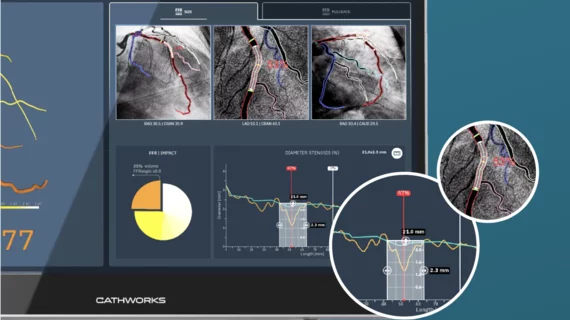Medtronic has announced a new strategic partnership with CathWorks, an Israeli company focused on the diagnosis and treatment of coronary artery disease. The new arrangement could lead to Medtronic acquiring CathWorks in the years ahead.
Medtronic has held a minority investment in CathWorks since 2018, the company noted in a new statement detailing the partnership. The company will now invest up to $75 million in CathWorks and begin promoting the CathWorks FFRangio System in the United States, Europe and Japan. If certain undisclosed milestones are met, Medtronic will then have the option to acquire CathWorks for up to $585 million, an opportunity that expires in July 2027.
The FFRangio System, which uses AI to obtain fractional flow reserve (FFR) measurements from routine x-rays, is at the center of this new partnership. Medtronic highlighted a recent study in JACC: Cardiovascular Interventions that found the FFRangio solution achieved a diagnostic accuracy of 93%, sensitivity of 91% and specificity of 94%.
“We believe strongly in the potential of the technology and are committed to strengthening our relationship with CathWorks to provide new, innovative technologies and solutions from diagnosis to treatment,” Jason Weidman, senior vice president and president of Medtronic’s coronary and renal denervation business, said in the statement.
“CathWorks has been looking for the right partner to help us expand the reach of the FFRangio system globally,” added Ramin Mousavi, president and chief executive officer of CathWorks. “Medtronic not only brings the strength of its commercial team to CathWorks, but a reputation of investing and defining new opportunities to revolutionize care.”
Related Fractional Flow Reserve (FFR) Content:
CT-FFR before TAVR improves detection of coronary artery disease, limits invasive imaging exams
VIDEO: HeartFlow FFR-CT sees increased interest after inclusion in the 2021 Chest Pain Guidelines
VIDEO: Cardiac CT now recommended as a front-line chest pain assessment tool
Key interventional cardiology takeaways from ACC.22
TAVR vs. surgery, FFR-guided PCI and DCB safety: Day 3 at ACC.22
VIDEO: Office-based cardiac CT and FFR-CT offer a new business model

